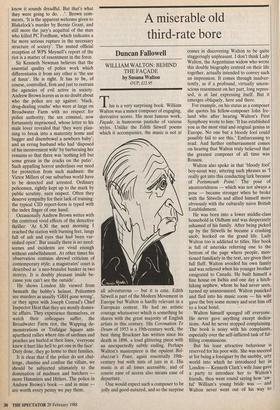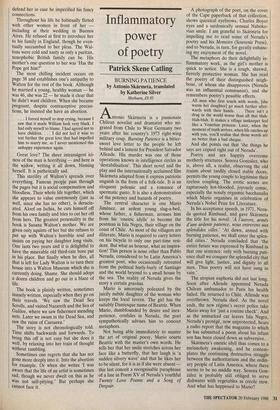A miserable old third-rate bore
Duncan Fallowell
WILLIAM WALTON: BEHIND THE FACADE by Susana Walton OUP, £12.95 This is a very surprising book. William Walton was a minor composer of engaging, derivative scores. His most famous work, Façade, is humorous pastiche of various styles. Unlike the Edith Sitwell poems which it accompanies, the music is not at all adventurous — but it is cute. Edith Sitwell is part of the Modern Movement in Europe but Walton is hardly relevant in a European context. He had no artistic courage whatsoever which is something he shares with the great majority of English artists in this century. His Coronation Te Deum of 1953 is a 19th-century work, the best thing Bruckner has written since his death in 1896, a loud glittering piece with an unexpectedly subtle ending. Perhaps Walton's masterpiece is the opulent Bel- shazzar's Feast, again essentially 19th- century but with tints of jazz in it. His music is at all times accessible, and of course ease of access also means ease of departure.
One would expect such a composer to be jolly and good-natured, and so the surprise comes in discovering Walton to be quite staggeringly unpleasant. I don't think Lady Walton, the Argentinian widow who wrote this double biography centred on their life together, actually intended to convey such an impression. It comes through inadver- tently, as if a profound, virtually uncon- scious resentment on her part, long repres- sed, is at last expressing itself. But it emerges obliquely, here and there.
For example, on his status as a composer she quotes his fellow-composer John Ire- land who after hearing Walton's First Symphony wrote to him: 'It has established you as the most vital and original genius in Europe. No one but a bloody fool could possibly fail to see this.' Embarrassing to read. And further embarrassment comes on hearing that Walton truly believed that the greatest composer of all time was Rossini.
Walton also spoke in that 'bloody fool' boy-scout way, uttering such phrases as really got into this conducting lark because of Portsmouth Point.' The pose of amateurishness — which was not always a pose — became stronger when he broke with the Sitwells and allied himself more obviously with the culturally naive British Establishment.
He was born into a lower middle-class household in Oldham and was desperately ashamed of his family. After being picked up by the Sitwells he became a crashing snob, hooked on the grand life. Lady Walton too is addicted to titles. Her book is full of asterisks referring one to the bottom of the page where people, men- tioned familiarly in the text, are given their full fluff. Walton avoided his own family and was relieved when his younger brother emigrated to Canada. He built himself a fine house on Ischia and one day a hitch- hiking nephew, whom he had never seen, turned up unannounced. Walton panicked and fled into his music room — his wife gave the boy some money and sent him off to a local hotel.
Walton himself sponged off everyone. He never gave anything except dedica- tions. And he never stopped complaining- The book is noisy with his complaints, especially over the self-inflicted task of ful- filling commissions. But his least attractive behaviour is reserved foihis poor wife. She was sneered at for being a foreigner by the snobby, arty world into which he introduced her in London — Kenneth Clark's wife Jane gave a party to introduce her to Walton's friends, then went round saying how 'aw- ful' William's young bride was — and Walton never went out of his way to defend her in case he imperilled his fancy connections.
Throughout his life he habitually flirted with other women in front of her including at their wedding in Buenos Aires. He refused at first to introduce her to his family in England, though he even- tually succumbed to her pleas. The Wal- tons were cold and nasty as only a puritan, xenophobic British family can be. His mother's one question to her was 'Has the Pope got him?'
The most chilling incident occurs on page 38 and establishes one's antipathy to Walton for the rest of the book. Although he married a young, healthy woman — he was 46, she was 22 — he made it clear that he didn't want children. When she became pregnant, despite contraceptive precau- tions, he insisted she have an abortion.
. . . I forced myself to stop crying, because I saw that it made William look very black. I had only myself to blame. I had agreed not to have children. . . . I did not feel it wise to test further the great love that had impelled him to marry me, so I never mentioned this unhappy experience again.
Great love? The sheer intransigent ici- ness of the man is horrifying — and here is the wjdow, writing it all down, blaming herself. It is pathetically sad. This sterility of Walton's spreads over everything. Famous people pass through the pages but it is social compensation and bloodless. Their whole life together, which she appears to value enormously (just as well, since she has no other), is deracin- ated. Aloof on Ischia, he cuts himself off from his own family and tries to cut her off from hers. The greatest personality in the book is Susana Walton's mother. We are given only squints of her but she refuses to put up with Walton's horrible soul and insists on paying her daughter long visits. One lasts' two years and it is delightful to have the miserable old third-rate bore put in his place. But finally when he dies, all that is left for Lady Walton is to turn their house into a Walton Museum which she is currently doing. Shame. She should adopt a dozen children and go out in a blaze of life.
The book is plainly written, sometimes inanely written, especially when they go on their travels. 'We saw the Dead Sea Scrolls, and visited Nazareth and the Sea of Galilee, where we saw fishermen mending nets. Later we swam in the Dead Sea, and saw the ruins of Caesarea.'
The story is not chronologically told. Time shifts backwards and forwards. To bring this off is not easy but she does it well, by relaxing into her train of thought without rambling. Sometimes one regrets that she has not gone more deeply into it. Into the abortion for example. Or when she writes 'I was aware that the life of an artist is sometimes sad, though we never dwelt on this as he was not self-pitying.' But perhaps she cannot face it.



















































 Previous page
Previous page